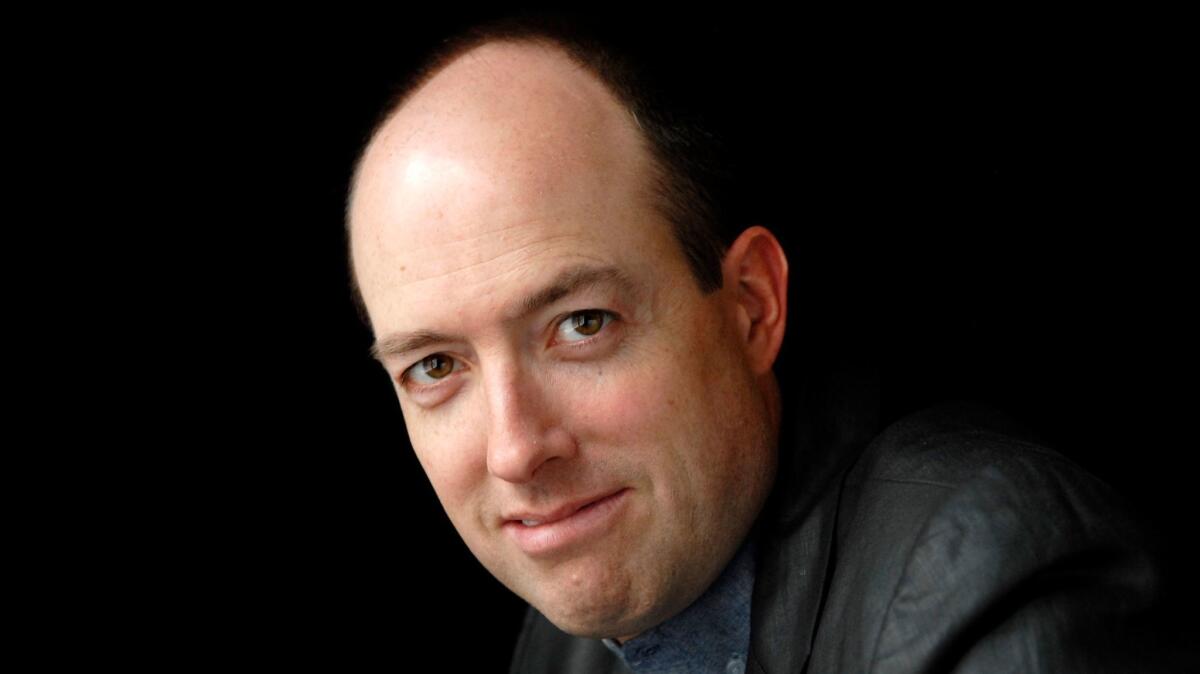Adam Haslett, L.A. Times Book Prize finalist, discusses ‘Imagine Me Gone’

Adam Haslett was still a student at Yale Law School when his first book, the short story collection “You Are Not a Stranger Here,” was published in 2002. The book earned rave reviews and was a finalist for the National Book Award and the Pulitzer Prize. He followed that up eight years later with “Union Atlantic,” a well-received novel about a real estate battle between an affluent banker and a retired schoolteacher.
His latest novel, “Imagine Me Gone,” is perhaps his most self-assured work to date. The book follows a married couple, Margaret and John, and their three children, Michael, Alec and Celia, who struggle to make sense of their lives after John takes his own life. Things get even more difficult after Michael is forced to deal with his own mental illness, and his mother and siblings try to get him the help he needs. The novel has drawn widespread praise from reviewers impressed with Haslett’s bold, original prose, and it was a finalist for the Kirkus Prize, the National Book Critics Circle Award and the Pulitzer Prize. It’s also among the five nominees for this year’s L.A. Times Book Prize for Fiction.
Adam Haslett will be at the LA Times Festival of Books on April 22nd at 10:30am. »

Motion graphic shows key speakers and locations for the 2017 Los Angeles Festival Of Books at the University of Southern California.
Haslett spoke with The Times via telephone from New York City, where he lives.
Would it be fair to say that “Imagine Me Gone” is the most personal book you’ve published?
Yeah, it would be fair to say that. I think of it in some ways as a kind of counterfactual account of my family, which is to say that I had taken certain things that did in fact happen, like the death of my father by suicide when I was 14. And I imagined my way into the point of view of the five characters in the family. There were two phases of that. One was to give myself permission to use a lot of personal material in the book, and then also to kind of give myself a second permission to liberate myself from the biographical fact, and shape it into a narrative. In some ways, some of the stuff that came to me first was the fictionalized material, and things that didn’t happen that could have, and then I used, certainly emotionally and some of it biographically, some of the experience from my own family.
So was this a painful book to write, or more cathartic, or maybe a little bit of both?
It was definitely both. It was undoubtedly the hardest thing I’ve ever written. There’s just no question in my mind that I had a deeper sense of catharsis that I’ve ever had. And it was painful. You know, the dwelling inside the minds of people that I knew that are suffering like that is not easy. I think the joy came in the writing of Michael, because of the humor. And I think that was one of the cathartic things. I had to find a way to get that on the page.
Did it take an emotional toll while you were writing it?
I spent five years writing it, and I didn’t really do anything else for those five years. I [was] fortunate to be able to work on it full time. It certainly took a toll, it took a part of my life. But it was also such a deep form of engagement, like writing always is, but that’s why you do it. You’re never the master. There’s always something more that could be done; there’s always a sort of a goad to make something more of what it is.
Depression and anxiety are such difficult things to put into words. Was it hard for you to find a way to describe those feelings? I’m thinking in particular of the scene where John kills himself, but also in the parts with Michael.
One of the things that, for obvious reasons, descriptions and reviews of the book focus on [is] the question of mental illness. It’s a phrase that never appears in the book itself. My kind of true north, not just in writing those two characters, but in writing all of them, is that I’m trying to imagine my way in a very literal sense, day to day, sitting at the desk, transporting myself in my head into the scenes I’m writing, to try to summon as fully as I can, what that world is. So in a sense, I don’t think of this as, “OK, the subject is depression, now how do you describe it.” It’s just that I’m always interested in interior life. I think that’s why I started as a writer, to try to bridge that unbridgeable gap between one person’s interiority and another’s. It’s, in a sense, another facet of trying to describe what it’s like to be in a mind, in a body, and those minds and bodies are ones that are under duress.
Three of the characters are involved in literature: Alec is a journalist, Michael is kind of a writer himself and Margaret is a library worker. Do you think literature can play a role in helping people with anxiety and depression, or dealing with family members or friends who struggle with mental illness?
Lately, I’ve been thinking of something related to that. I’ve been reading novels and short stories and poetry and literature of one kind or another for so long now, my whole life, that I realized that I take for granted that people have that kind of sense of the sheer variety and nuance of people’s fates and lives and relationships, and the myriad ways of understanding and presenting that. And that’s just become part of my worldview and my kind of ethics and aesthetics and everything else. I don’t know who I would be without that in place. So I think certainly the answer for me is yes.
We learn a lot about Michael through the music that he loves. Do you share his obsession with music?
Not to the same extent. My brother is a music fanatic, and some of that material is drawn from him. And I grew up, as a result of that, listening to a good deal of that music. Certainly, music was a key for me in writing the book, but Michael is not in that sense an autobiographical character.
Do you ever hear from readers [who tell you that] the book has helped them get through mental illness, or a difficult time in their lives?
I’ve had a lot of that, and it’s very moving. Parents of children with psychiatric problems, people themselves who’ve dealt with anxiety and depression. Both in person, when I’ve been on the road, but also over email. I’ve been quite moved by that. I just see people and they begin to tell me their own stories, which is amazing to me, because I realize what fiction can do, but I was so far inside when I was writing that I had no idea whether it would really translate, because it’s an eccentric book in some ways. I think the lesson is, the more particular you are, the more other people can actually see it themselves.
There’s a lot of hope in the novel. Even though it has two tragic events, it’s not depressing. Was it important to you that you let some light in, that it wasn’t going to be just a dark, dark book?
Yeah, it was. I sometimes describe it as kind of a love story about a family; there is a way in which it’s a portrait of a family that really loves one another. I think one of the things that I knew better when I finished the book than I did before was that often, when you’re trying to help someone, particularly someone you love, you have a need for that person to be a particular way, and so the ways in which you try to help them are ways that call them to be a certain kind of person, which may or may not be the person they need to be. And I think that was one of the things that came to me by writing it from the five points of view, because while reading it, you sort of experience how someone tries to help and then how someone experiences that attempt at help.
When you finished [writing the book], did it take you a long time to decompress?
[Laughs.] I still feel like I’m doing it a little bit. But yeah, I’m not like Trollope, I can’t just turn the page and start another novel. I have a chance to be a little more engaged in the world, and in terms of writing, engage in some shorter and more collaborative projects.
Schaub is a writer who lives in Texas.
More to Read
Sign up for our Book Club newsletter
Get the latest news, events and more from the Los Angeles Times Book Club, and help us get L.A. reading and talking.
You may occasionally receive promotional content from the Los Angeles Times.






